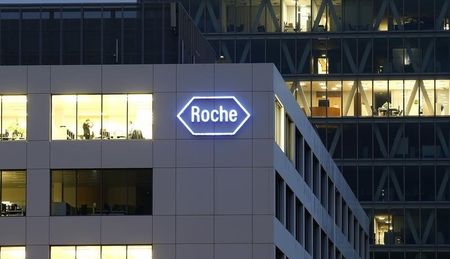Roche reports Q3 sales growth, driven by strong pharma performance and Actemra
2024.10.23 05:38

Investing.com — Roche (SIX:) on Wednesday reported a slight increase in its sales for the third quarter, surpassing analyst expectations.
This growth was primarily driven by the company’s pharmaceutical segment, which showed a 3% increase compared to expectations.
Actemra was a major contributor to this outperformance, as the company observed slower-than-anticipated erosion from biosimilars.
“3Q sales are a small positive, but we largely see the underlying growth drivers as in-line. The much stronger Actemra sales will be seen as a lower quality beat and is unlikely to be sustained beyond the short-term,” said analysts from UBS in a note.
Other strong performers included Phesgo, which rose by 6% against consensus estimates, Hemlibra, with a 5% increase, and Vabysmo, which grew by 4%.
These gains effectively counterbalanced the decline seen in Tecentriq, which fell by 5%.
The third quarter also saw a slight acceleration in underlying pharmaceutical growth, with a year-over-year increase of 10% when adjusted for constant exchange rates.
This marks an improvement over previous quarters, where growth was recorded at 9% in the second quarter and 7% in the first quarter.
However, the diagnostics segment experienced a slight decline in growth rate, reporting a 7% increase, down from 9% in the prior quarter and 8% in the first quarter.
Roche reiterated its guidance for 2024, maintaining expectations for mid-single-digit sales growth at constant exchange rates, which aligns with UBS analyst projections of 7.2%.
“In 4Q, we are expecting P1b data for trontinemab at CTAD and P2 data for parkinson’s asset, prasinezumab (see full detail on our expectations here), which we see as the most important near-term drivers for Roche,” UBS said.
The company also expects a high single-digit increase in earnings per share, excluding the impact of tax dispute resolutions from 2023, with UBS analysts estimating a growth of 10.9%.
In terms of its pipeline, Roche has decided to discontinue several Phase 2 programs, including RG6341 for chronic cough, tobemstomig, a PD-1/LAG-3 bispecific for solid tumors, and bepranemab for Alzheimer’s disease, the rights for which have been returned to UCB.
However, it faces challenges, including potential market penetration issues for Vabysmo due to competition from Eylea, and increased competition for Ocrevus from new therapies in multiple sclerosis, said analysts from UBS in a note.
Despite these challenges, there are opportunities for growth as Roche continues to explore new avenues within its product offerings and capitalize on its existing strengths.








